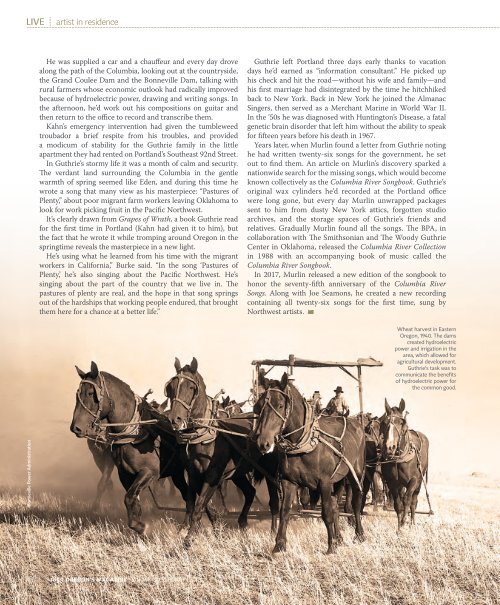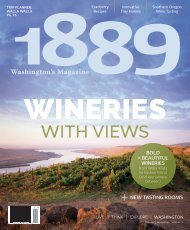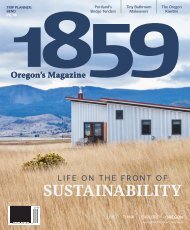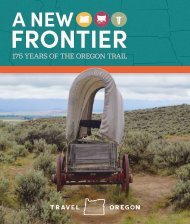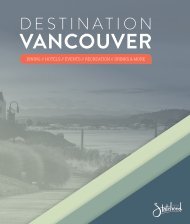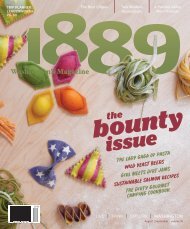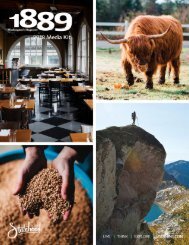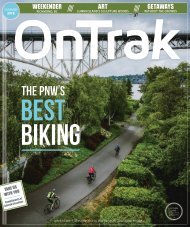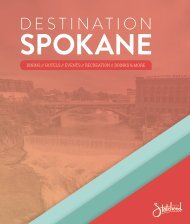Create successful ePaper yourself
Turn your PDF publications into a flip-book with our unique Google optimized e-Paper software.
artist in residence<br />
He was supplied a car and a chauffeur and every day drove<br />
along the path of the Columbia, looking out at the countryside,<br />
the Grand Coulee Dam and the Bonneville Dam, talking with<br />
rural farmers whose economic outlook had radically improved<br />
because of hydroelectric power, drawing and writing songs. In<br />
the afternoon, he’d work out his compositions on guitar and<br />
then return to the office to record and transcribe them.<br />
Kahn’s emergency intervention had given the tumbleweed<br />
troubador a brief respite from his troubles, and provided<br />
a modicum of stability for the Guthrie family in the little<br />
apartment they had rented on Portland’s Southeast 92nd Street.<br />
In Guthrie’s stormy life it was a month of calm and security.<br />
The verdant land surrounding the Columbia in the gentle<br />
warmth of spring seemed like Eden, and during this time he<br />
wrote a song that many view as his masterpiece: “Pastures of<br />
Plenty,” about poor migrant farm workers leaving Oklahoma to<br />
look for work picking fruit in the Pacific Northwest.<br />
It’s clearly drawn from Grapes of Wrath, a book Guthrie read<br />
for the first time in Portland (Kahn had given it to him), but<br />
the fact that he wrote it while tromping around Oregon in the<br />
springtime reveals the masterpiece in a new light.<br />
He’s using what he learned from his time with the migrant<br />
workers in California,” Burke said. “In the song ‘Pastures of<br />
Plenty,’ he’s also singing about the Pacific Northwest. He’s<br />
singing about the part of the country that we live in. The<br />
pastures of plenty are real, and the hope in that song springs<br />
out of the hardships that working people endured, that brought<br />
them here for a chance at a better life.”<br />
Guthrie left Portland three days early thanks to vacation<br />
days he’d earned as “information consultant.” He picked up<br />
his check and hit the road—without his wife and family—and<br />
his first marriage had disintegrated by the time he hitchhiked<br />
back to New York. Back in New York he joined the Almanac<br />
Singers, then served as a Merchant Marine in World War II.<br />
In the ’50s he was diagnosed with Huntington’s Disease, a fatal<br />
genetic brain disorder that left him without the ability to speak<br />
for fifteen years before his death in 1967.<br />
Years later, when Murlin found a letter from Guthrie noting<br />
he had written twenty-six songs for the government, he set<br />
out to find them. An article on Murlin’s discovery sparked a<br />
nationwide search for the missing songs, which would become<br />
known collectively as the Columbia River Songbook. Guthrie’s<br />
original wax cylinders he’d recorded at the Portland office<br />
were long gone, but every day Murlin unwrapped packages<br />
sent to him from dusty New York attics, forgotten studio<br />
archives, and the storage spaces of Guthrie’s friends and<br />
relatives. Gradually Murlin found all the songs. The BPA, in<br />
collaboration with The Smithsonian and The Woody Guthrie<br />
Center in Oklahoma, released the Columbia River Collection<br />
in 1988 with an accompanying book of music called the<br />
Columbia River Songbook.<br />
In 2017, Murlin released a new edition of the songbook to<br />
honor the seventy-fifth anniversary of the Columbia River<br />
Songs. Along with Joe Seamons, he created a new recording<br />
containing all twenty-six songs for the first time, sung by<br />
Northwest artists.<br />
Wheat harvest in Eastern<br />
Oregon, 1940. The dams<br />
created hydroelectric<br />
power and irrigation in the<br />
area, which allowed for<br />
agricultural development.<br />
Guthrie’s task was to<br />
communicate the benefits<br />
of hydroelectric power for<br />
the common good.<br />
Bonneville Power Administration<br />
60 <strong>1859</strong> OREGON’S MAGAZINE JANUARY | FEBRUARY <strong>2018</strong>


